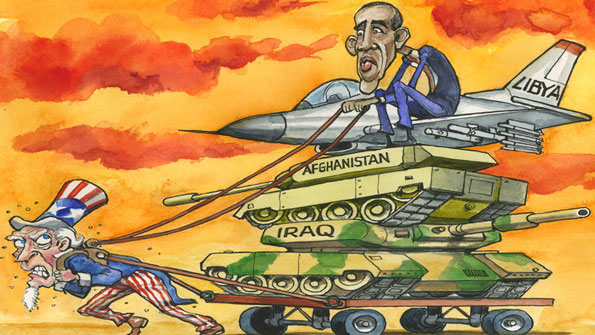
From Lexington, the Economist: “I venture to say that no war can be long carried on against the will of the people.” Edmund Burke should be alive today. None of America’s several wars is popular. According to a Pew Research poll this week, a majority of Americans (56%) now believe that their troops should come home from Afghanistan as soon as possible. Only 39% favour waiting for the situation there to stabilise, even though most still think that the original decision to go to war was right. In the case of Libya there was never any equivalent enthusiasm to intervene in the fighting between Muammar Qaddafi and the rebels. And most Americans are delighted that the present plan is to quit Iraq by the end of this year.
America has reason to be war-weary. Since September 2001 it has spent some $1.3 trillion on the wars in Iraq and Afghanistan, in which some 6,000 service personnel have died. Even conservative Republicans, the group keenest on “staying the course”, have started to tell pollsters that America should pay less attention to problems overseas and more to the growing ones at home. In their New Hampshire debate several Republican presidential candidates joined the cry to bring the boys home—“as soon as we possibly can,” said Mitt Romney, the putative front-runner. . . .
At home, however, the least costly of America’s wars, the one in Libya, is turning into a serious headache. . . .
The White House boasts that since early April America has had only a “non-kinetic”, “supporting” role in Libya. It has no troops on the ground and is not exchanging fire with hostile forces (unless you count the odd drone strike). That makes the war cheaper for America while allies do the dirtier work—the opposite of the dismal pattern in Afghanistan. This looked like a perfectly splendid arrangement, until one of Mr Obama’s advisers was quoted as describing it as “leading from behind”.
Such a phrase should never have been uttered in the hearing of a journalist. Since its publication in the New Yorker, “leading from behind” has become a prime exhibit in the Republicans’ scornful excoriation of Mr Obama’s foreign policy. The president now finds himself accused of being both a warmonger for entering the war and a wimp for his lame prosecution of it. . . .
It is odd. A weary America has adopted Mr Obama’s wary instincts in foreign policy. He is making a good fist of extricating America from the big wars he inherited from George Bush. But the tiny one he entered so cautiously himself, in which not a single American soldier has died, has brought him disproportionate grief. Even before it disposed of bin Laden, America had lost its appetite for venturing abroad in search of monsters to destroy. (graphic: Economist)
Image: economist%206%2026%2011%20US%20weary%20of%20war_0.jpg
